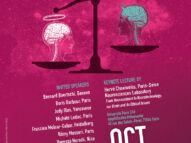events
events, seminars
October 14, 2022 – Anne-Noël Samaha (University of Montreal) – Addiction to cocaine: How you take the drug is more decisive than how much
Exceptionally this seminar will take place in Salle des thèses (3rd floor) – Saint-Germain-des-Prés Campus, 45 rue des Saints Pères, 75006 Paris
A widely used preclinical procedure to study features of cocaine addiction involves allowing laboratory animals to take drug… Continue reading
events, seminars
October 7, 2022 – Fekrije Selimi (Collège de France, Paris)- The developmental history of the molecular synaptic code controlling excitatory connectivity
The mature brain results from the formation of precise networks between functionally and morphologically distinct types of neurons. A given neuron forms synapses with a limited number of partners and on precise subcellular localizations. Understanding what controls this specificity is… Continue reading
events, INC Meetings
October 20, 2022 – INC Day 2022 – Neuroethics
This year, the INC Day, organized in partnership with the masters programs BioMedical Engineering – Paris and NeuroParis and supported by the Faculty of sciences of Paris Cité University and the Graduate school Psychological science, is dedicated to ethics. What… Continue reading
events, seminars
September 30, 2022 – Valeria Cavalli (Washington University School of Medicine, USA) – Satellite Glial Cells in sensory nervous system health, injury and disease
Exceptionally this seminar will take place in Salle des thèses (3rd floor) – Saint-Germain-des-Prés Campus, 45 rue des Saints Pères, 75006 Paris
Research in my laboratory focuses on elucidating the principles and mechanisms by which peripheral nervous system neurons regenerate,… Continue reading
events, seminars
September 23, 2022 – Sébastien Bouret (ICM, Paris) – Neural basis of decision-making in primates. In the lab and beyond
The presentation will cover the cognitive and neurobiological functions underlying cost-benefits decision making in primates. After covering data from laboratory experiments, I will present recent studies aimed at understanding how these data can help understand how specific neuro-cognitive operations allow… Continue reading
events, seminars
September 16th, 2022 – Sebastian Jessberger (University of Zurich) – Mechanisms of life-long stem cell activity in the mammalian brain
Neural stem cells generate new neurons throughout life in the mammalian hippocampus. This process, called adult neurogenesis, is critically involved in certain forms of learning and memory. In addition, failing or altered neurogenesis has been associated with a number of… Continue reading
events, seminars
June 24th, 2022 – Pierre Paoletti (Institute of Biology of ENS, Paris) – New lights on neurotransmission: from molecular optogenetics to excitatory glycine receptors
The function of the human brain and its remarkable capacity for information storage and experience-dependent change hinge on the dynamics of chemical synapses – main ‘contact points’ between neurons. My team has a long-standing interest in studying the molecular principles… Continue reading
events, seminars
June 3rd, 2022 – David Smith (Cornell University in Ithaca, NY, USA) – The Hippocampus and the Neural Basis of Context-Dependent Memory
The environmental context is known to plays a profound role in memory. The context is a potent retrieval cue that primes the memories that belong to that context. This is highly adaptive because it prevents interference from memories that belong… Continue reading
events, seminars
Thursday, May 12th, 2022 – Melissa Bowerman (Keele University, UK) – Combining bioinformatic and drug repurposing approaches to develop second-generation therapies for spinal muscular atrophy
Spinal muscular atrophy (SMA) is a devastating childhood disease caused by loss of function of the survival motor neuron (SMN) gene, leading to the death of nerve and muscle cells. The first SMN gene replacement therapies have recently been approved… Continue reading
events, seminars
May 13rd, 2022 – Alain Chédotal (Institut de la Vision, Paris) – Development and evolution of visual projections
In most animal species including humans, commissural axons connect neurons on the left and right side of the nervous system. This communication between the two sides of the brain and spinal cord is necessary for a series of complex function,… Continue reading

